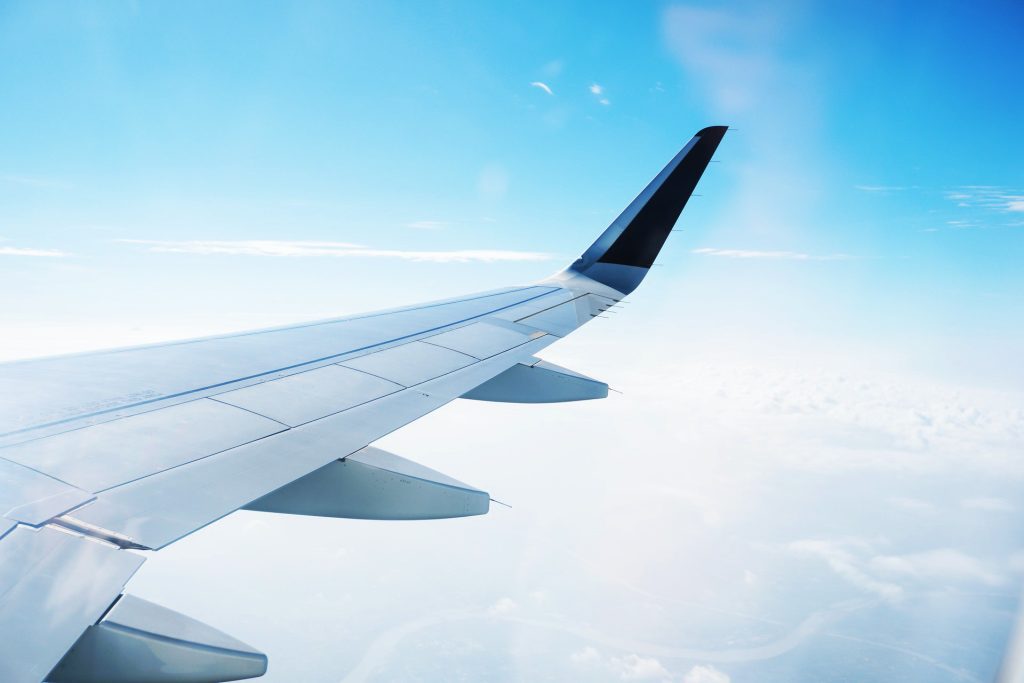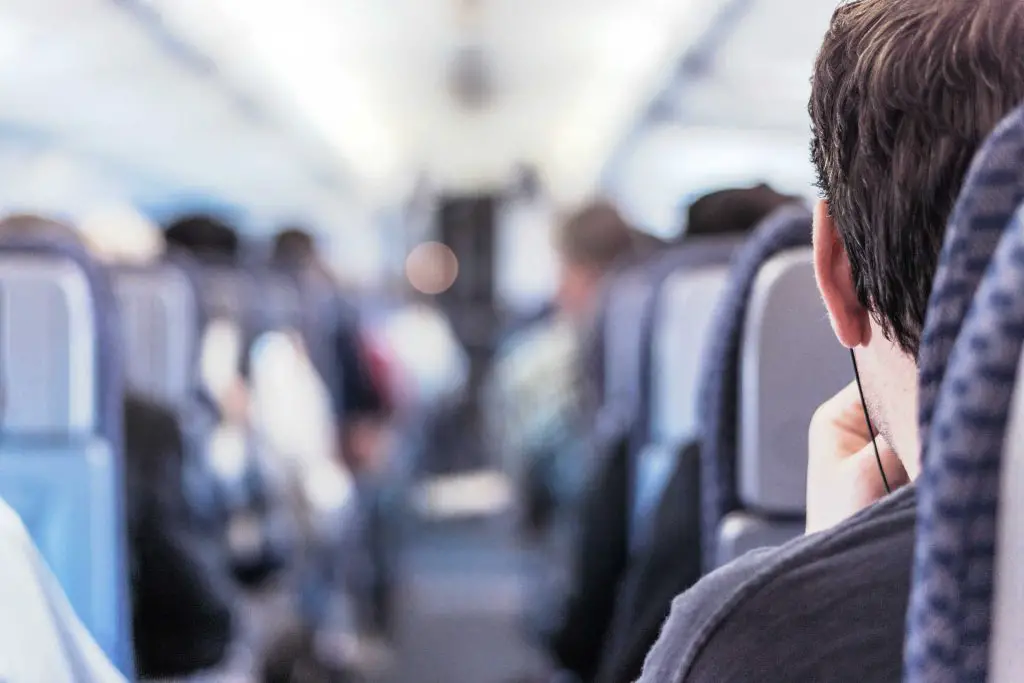Whether you’re traveling for work or a vacation, a long-distance trip is usually exciting. But when you reach your destination, your sleep pattern can be disrupted by jet lag, leaving you feeling exhausted, demotivated and generally under the weather. That’s no way to start a holiday.
There’s no medical cure for jet lag. But knowing how to minimize the effects of jet lag and the natural remedies for jet lag symptoms can help you feel better and enjoy your trip more.
This guide will explain the causes and symptoms of jet lag, as well as give you 15 superb tips on how to get over jet lag and the best products to help with jet lag symptoms.

What causes jet lag?
The circadian rhythm is your body’s internal clock that tells you when to go to sleep or wake up. Jet lag disrupts our circadian rhythm; sleep disorders are the result, especially when traveling by plane over a long distance.
The rapid change of time zone doesn’t give your body enough time to adjust, so your internal day-night cycle falls out of sync with the time at your destination. This can happen any time you travel over three or more time zones, whether traveling between countries or on an domestic flight.
Not everyone feels jet-lagged after a long flight. A few factors affect how severe the symptoms can be as the body adjusts. These include:
- The direction of travel – jet lag is more likely after traveling eastward
- Number of time zones crossed – symptoms tend to be worse on longer flights
- Total travel time, including any stop-overs
- Time of arrival at your destination
- Length of your trip, including any subsequent flights
- Your normal sleep schedule
Common jet lag symptoms
The most common symptoms of jet lag include:
- Difficulty getting to sleep at bedtime
- Difficulty waking up in the morning
- Tiredness
- Poor quality sleep
- Difficulty concentrating and poor memory
In addition, jet lag sometimes causes other symptoms such as dizziness, loss of appetite, gastrointestinal problems, anxiety and general malaise.
How long does jet lag last?
Luckily jet lag symptoms don’t usually last very long, and most people adjust to their new time zone within a few days. A measure has been one day for each hour of time change, but it will vary with each person.

Jet lag prevention: before you fly
No jet lag prevention method is guaranteed to work – there is no miracle pill. But there are a few things you can do to minimize your jet lag symptoms. These changes may not suit everyone, but if you want to avoid severe effects of jet lag, trying some of these steps could help.
Choose your flight carefully
Flight departure times are a factor in helping to reduce jet lag. I’ve found that intercontinental flights that depart in the late afternoon work well from my home in Vancouver. There’s time to relax, enjoy a meal, then prepare to rest and attempt to sleep, with minimal cabin disruption, while crossing multiple time zones
Flights that depart late at night can work like this too. But it can be a challenge, as any sleep you manage to get on a red-eye flight may be disrupted by meal services, cabin lighting and general passenger noise.
You should choose your seat carefully as well. A window seat will give you fewer disruptions and somewhere to rest your head, and seats away from the galleys and bathrooms will generally tend to be quieter.
Shift your sleep schedule
The best way to avoid jet lag symptoms is to shift your body clock to suit your destination. Making a minor adjustment to your sleep schedule each day for a week before your flight will get your circadian rhythm closer to the one you’ll have in the new time zone.
So if you are traveling east, make your bedtime 10 minutes later each day. If you’re traveling westwards, you can try going to bed 10 minutes earlier each day, but it can be more difficult to make yourself feel ready for sleep earlier than usual. Using a sleep mask and earplugs may help, and you can also try using lavender essential oil or drinking chamomile tea if sleep problems are an issue.
You can try changing your watch and clocks to match the time zone you are traveling to, as that will get your mind used to your new schedule. But that may interfere in your daily work routine.
Get plenty of rest
Not everyone can make major changes to their schedule before a flight. So the next best thing is to get a few good nights of sleep before you travel. Being well-rested before you fly will give your body the energy and resources it needs to handle jet lag better.
So try to get plenty of rest and avoid staying up late doing last-minute packing before your flight.

Try a jet lag app
You can also use jet lag apps like Timeshifter to create a jet lag plan. It compares the time zone at your home location to the one you are traveling to and calculates what you need to do to realign your circadian rhythm.
The app will then send you reminders based on your travel schedule and advise you on light exposure, when to take melatonin and when to avoid caffeine. It might not eliminate jet lag completely, but it could help with jet lag symptoms.
Jet lag prevention: during your flight
Once you’re on board the plane, there are a few key steps you can take to help you adjust to the new time zone and avoid the worst symptoms of jet lag.
Stay hydrated
Good hydration is one of the most important tips for avoiding severe jet lag. Spending hours in the dry air of the air-conditioned cabin will dehydrate your body, leading to headaches and tiredness.
Take a refillable water bottle on board with you. You can fill it up once you have been through airport security, and then the flight attendants will be able to refill it for you on the plane.
And while you might be tempted to relax with an alcoholic drink on the flight, alcohol will dehydrate you even more. It’s better to avoid it if possible.
Sleep at the right time
One of my pro travel hacks is to change my watch or smartphone to my destination’s time zone as soon as I board the plane. If it’s midnight in London, I’ll try to get to sleep as quickly as possible and nap at times that are appropriate for the new time zone.
I also use a Melatonin spray to help me fall asleep in a natural way. After years of using No Jet Lag pills with minimal success, Melatonin spray has really worked for me. I highly recommend it over sleeping pills, which can be addictive and leave you feeling groggy. You can read more on melatonin below.
Avoiding blue light from electronic devices will help you to doze off more easily. If you’re traveling during daylight hours, try not to nap for more than 20 minutes each time so that you feel refreshed but can still sleep at night.
Make yourself comfortable
Do everything you can to get yourself comfortable for sleep while on the plane, even if that means changing into a comfy outfit for the flight. Your airline may provide earplugs and a sleeping mask, and you can ask the flight attendant for an extra blanket if the cabin temperature is too cold, which is often the case.
I never travel without my own sleep kit in my bag. A pair of noise-cancelling earplugs or noise-cancelling headphones blocks out the sounds of the crew and passengers moving around. A sleep mask ensures that the cabin’s artificial light doesn’t disrupt my sleep.
A great travel pillow is also a must-have for long haul flights. I’m a huge fan of the Cabeau travel pillow. It attaches to your seat’s headrest and keeps your head in place, supporting it and your neck as you drift to sleep. I’ve managed up to six hours of sleep using the Cabeau pillow, which is no small feat on any long flight!
It’s also worth packing a hoodie or fleece jacket and some comfy socks to keep warm. Alternatively, you could pack a pashmina that doubles as a light blanket, my own cosy and stylish covering of choice.
Order light meals
An upset stomach is among the most common jet lag symptoms, so it’s better to book light meals for your flight to reduce your risk of stomach ache. Opt for light proteins and plenty of fruit and vegetables, and avoid anything too spicy or in a rich sauce.
How to get over jet lag
Even if you follow your jet lag plan, there’s still a chance that you’ll feel jetlagged once you arrive at your destination. Everyone reacts differently to a change in time zone, and recovery times also vary.
There isn’t a cure for jet lag so the best way to address jet lag symptoms is a combination of natural remedies for jet lag. These include exposure to light, healthy eating and adjusting your sleep patterns.
Video courtesy of the American Academy of Sleep Medicine
Keep your first day low key
If you’re traveling across more than three time zones, you may experience some jet lag and it may take a day or two to get over any symptoms. The usual measure is one day of recovery for each hour of time change. For long haul international trips, that can mean weeks, in theory.
If possible, avoid booking any major events or meetings on the first day of your trip to give yourself time to recover from the flight first. There’s no point visiting a historic landmark if you’re so tired you can barely keep your eyes open, and you’ll never give your best performance at an important meeting if you’re dozing off over your notes.
If you’re near a pool, go for a refreshing swim. A bit of exercise followed by a light nap of 20 minutes or 1.5 hours can reenergize you enough to last until evening.
Seek out natural light
Light has the most significant effect on circadian rhythm, and natural light is best of all. Even on a cloudy day, sunlight sends a signal to your brain that helps it to set your internal clock. So if you arrive at the crack of dawn in the bright light in the morning, getting outside for some fresh air and sunlight will help to put you on the right path to recovery from jet lag.
If you’re traveling at a time of year when there won’t be much natural light, a portable light therapy lamp will have a similar effect on your circadian rhythm.
On the other hand, if you arrive later in the day, avoiding light can help with jet lag. This includes artificial light from electronic devices, which can disrupt your sleep patterns. Then you should try to get outside early the next day for an extended dose of sunlight.
Consider taking melatonin for jet lag
Melatonin is a hormone produced in your body that regulates your circadian rhythm and helps you to fall asleep. Taking a melatonin supplement can help you with recovering from jet lag by realigning your circadian rhythm to the new time zone without leaving you feeling groggy.
Melatonin is non-addictive and doesn’t usually have any significant side effects. However, it may interact with some medications, so it’s best to check with your doctor before taking melatonin for jet lag. You can buy melatonin supplements or melatonin sprays without a prescription from health food stores and online.
I’m a big fan of melatonin spray as it’s easy, immediate and effective. I use it on the plane before napping, when I’m preparing for bed at my destination, and when I wake up in the middle of the night. It’s been the most effective jet lag treatment I’ve ever used.
Other sleeping pills don’t have the same effect on your circadian rhythm and can leave you feeling drowsy the next day, increasing the risk of accidents. These sleep aids can also be addictive, so it’s best to speak to your doctor before taking them.
Shift your schedule
You might feel tired enough to fall asleep as soon as you get to your accommodation, but it’s better to try and follow the local schedule as soon as possible. So have your meals at the appropriate times and go to bed at the right time for your destination, setting an alarm so you don’t oversleep the following day.
And if you really can’t avoid sleep, set an alarm so that you only nap for 20 minutes. This will revive you without affecting your sleep later on.

Eat healthily and take vitamins
Feeling jetlagged puts a lot of stress on your body, so it’s a good idea to try and eat as healthily as possible. Make sure you have plenty of healthy proteins as well as fresh fruit and vegetables, and try to limit how much junk food you eat.
Taking vitamins can help too. Vitamin D is connected with melatonin production, and Vitamin B12 helps keep your energy levels up. So both supplements could help with jet lag symptoms.
Keep hydrating
Drinking plenty of water is one of the best ways to fight jet lag, so don’t stop hydrating once you’re back on the ground.
It also helps if you avoid alcohol and caffeine, as both can affect your sleep quality. Coffee can help you get moving in the morning, but too much caffeine could leave you feeling jittery and make it harder to get to sleep later on.
Create a better sleep environment
Not every room is ideal for restful sleep, so it’s worth calling ahead to see if your hotel can do anything to make your stay more comfortable. They may be able to provide you with different pillows or ensure that you’re given a room in a quieter part of the building, away from the bar or elevators.
Of course, not all accommodation can be tailored to your needs, so it’s worth ensuring you pack things like essential oils and a sleep mask. You could even take a portable white noise machine to help block out any noise outside your room.
Having jet lag can feel awful when you’re lying awake in the small hours of the morning or struggling to keep your eyes open at lunchtime. But the good news is that it won’t last forever, and most people get over their jet lag symptoms in a few days.
If you feel like you’ve tried everything, and nothing seems to be working, worrying about it won’t make your jet lag symptoms any better. So try to accept that you feel tired and let your body continue recovering from jet lag at its own pace. Take extra care of your health while you are still jet lagged and you will be over the worst of it soon.
Pin for Later

- 7 unique places to experience Ainu culture in Hokkaido - March 22, 2024
- How to enjoy Vancouver’s Cherry Blossom Season - March 21, 2024
- 23 surprising things to do in Abbotsford - March 18, 2024

